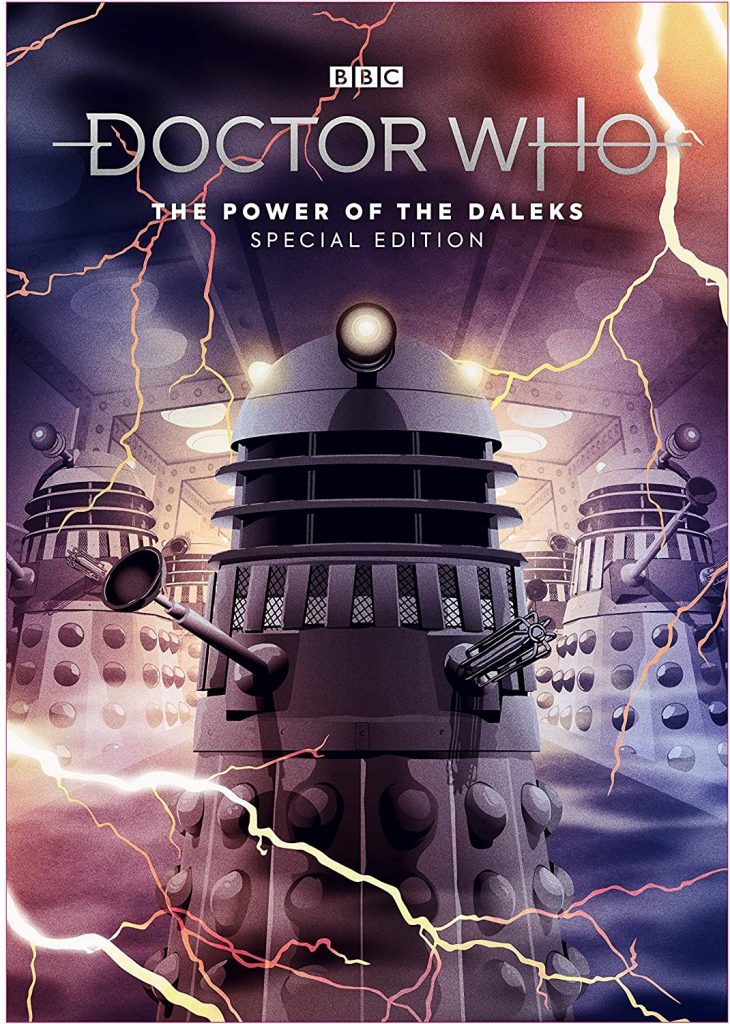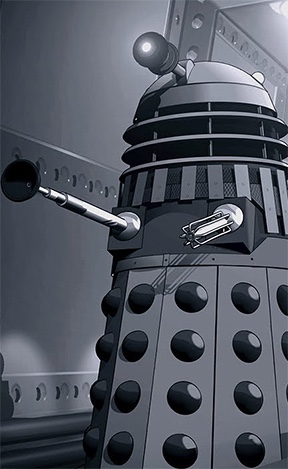Review by Tim Robins

I am firmly of the opinion that Doctor Who was never made to be animated and The Power of The Daleks exemplifies the difficulties of turning a 1966 TV drama series into a cartoon. The new ‘Special Edition’ DVD/BluRay is the second attempt to get it right.
I gave the original release a pass because – animation. It just isn’t the same as watching the actual series as originally broadcast for me, of which I have fond memories, although not of the three recent releases – The Macra Terror, The Faceless Ones and this. Fury from the Deep is also on the way – but I do remember quite of bit of that.
The Power of the Daleks is Patrick Troughton’s first outing as The Doctor and the BBC seem to have thrown a lot of creative talent at the story. The script is one of the few 1960s Dalek not to be written by Terry Nation, something that would help consign the broadcast story to oblivion once Nation tried to cease all the rights to the Daleks for an American TV series.
(It is fun to see the way fans have been keen to apportion who did what in the creatures’ creation – so Raymond Cusick is credited as their designer on the disk as if, one day, the answer to the trivia question ‘Who created the Daleks?’ will no longer be Terry Nation).
The Power of the Daleks designer Derek Dodd cleaves close to the Cusick designs for the early Daleks adventure, including sliding pepper pot shaped doors as first seen back in 1963.
Doctor Who powerhouses David Whitaker and Dennis Spooner create a script that focuses as much on the mystery of this new ‘Doctor’ as its frankly ramshackle story of power plays among the scientists and administrators in a colony on the planet Vulcan – a desperately small set of painted backdrops, prop rocks and shallow pools of what is supposed to be mercury because, well that’s the sort of thing planets were like back then. The writing team are adept at spinning out various mysteries, although I was left mystified about the motives for the colony rebellion that forms part of the backdrop to this story.
(If anyone knows, please write in and tell me because I’ll be darned if I’m watching it again anytime soon).
This animated edition has been smartened up thanks to the work of a five-person team, comprising talents such as Adrian Salmon, whose many art credits include comic strips for Doctor Who Magazine. Adrian storyboarded the new sequences and did extensive new cell shading work for this version of the release, whilst the equally prolific Martin Geraghty, equally well known for his work on DWM, has also returned for more drawing and designs and the work here is excellent.
Some have criticised the likeness of Doctor Who companion Ben (Michael Craze) and, while I agree that he seems too lantern jawed and haggard at times, John Cura’s telesnaps of the actual broadcast reveal that he was squarer jawed and gaunt than BBC publicity shots suggest.

Crucially, the animated Daleks glide about with a suitable air of menace.
This story seems to have inspired quite a lot of Dalek stories of the last decade. The story opens with a lone Dalek being revived from a capsule that has been buried for two hundred years. Only the Doctor knows how dangerous one Dalek can be and is not in the least taken-in by its claim, “I-Am-Your-Ser-vant’. And only The Doctor seems aware the machine contains a horrible bundle of hate, briefly glimpsed as the crawly thing scuttles around the capsule. What the hapless scientists also don’t know is that three Daleks can soon become many more.
Perversely, in the interests of authenticity, the animation team have reproduced a Dalek assembly line scene that, in the live broadcast, was achieved by shop bought toy Daleks of not entirely accurate design. However I do want to draw attention to some smashing effects work around a bubbling incubator and a nice touch of seeing one of the scientists looking on through a window in the far background.
The Power of The Daleks DVD/BluRay comes with informative and entertaining extras. The “Making of” documentary benefits from the input of fans Andrew Beech and Kim Newman and underlines the way the history of Doctor Who is also a history of television production and of society in general. A clip of the Z-Cars cast sharing the same rehearsal space has a startling script read through in which cast and crew are seen furiously puffing away at pipes (for the management, and cigarettes for the hoi polloi?).
But it is a complete episode of Whicker’s World, documenting the new craze for horror, that really reveals the professional culture of the BBC and the cultural mores of the time.
Celebrity reporter Alan Whicker meets actors such Christopher Lee and Barbara Steele, the Daleks’ “creator” (sic) Terry Nation and anyone else he can find, providing a prime example of asking the wrong people the wrong questions. Typically of media professionals, Whicker assumes the audience have no understanding of anything and peers into the world of horror fans and creatives as if he had just lifted a rock and must now protect viewers from whatever disgusting things crawled out.
My initial interest in seeing Black actors in an opening scene turned to disgust of my own as I realised that they were included to illustrate Whicker’s claim that horror stems from “primitive” desires. Worse is to follow as he peruses his second thesis: that Horror is apiece with pornography. This includes a visit to a Soho (?) comic shop that for some reason has placed a grubby fetish ‘zine on a shelf among the otherwise run of the mill monster mags of the ‘Famous Monsters of Filmland’ variety. This is obviously staged; I, and any comic book fan, can assure you anything remotely sexual was hidden behind ‘adults only’ sections glimpsed while rummaging the backstreets for American comics.
There is a very uncomfortable scene that lingers on Barbara Steele writhing about as if experiencing levels of jouissance hitherto unimagined by Roland Barthes. A cut away to Whicker tittering and squirming like a Galton and Simpson character doesn’t help matters.
In contrast, good fun is to be had at the interview with Whicker and Nation achieved by an artful, single take dolly shot only spoiled by the fact a Dalek that is supposed to be sneaking up behind them appears to get stuck and is left behind.
Thankfully, the documentary, by turns sleazy and silly, ends with Whicker exiting pursued by a Yeti.
I’m not sure where I stand on the animated stuff. The team are obviously working on a tight budget, but it’s hard to capture a comedic/dramatic performance, particularly if the actor in question is the mercurial Patrick Troughton. Curiously, a scene of Troughton playing a flute and dancing a jig was edited out (it is included on a disk as an “Easter Egg”) but, compared to a later scene in which the Doctor walks past the TARDIS console, it is actually fine.
What impresses is the team’s commitment to achieving the best standard they can given the limitations – a sentiment worthy of the series itself. There is justifiable professional pride in the work presented here, particularly in capturing the noirish lighting and shots that give the story an edge.
Tim Robins
• The Power of the Daleks – Special Edition is available here from AmazonUK (Affiliate Link)
VIDEO LINKS
An Interview with animation director Charles Norton
The original version of this review wrongly noted Mike Collins as working on the new Special Edition sequences, these were in fact the work of Adrian Salmon and Martin Geraghty, among others. Our apologies for the error – the reviewer is now being hunted on Vulcan by Daleks.
A freelance journalist and Doctor Who fanzine editor since 1978, Tim Robins has written on comics, films, books and TV programmes for a wide range of publications including Starburst, Interzone, Primetime and TV Guide.
His brief flirtation with comics includes ghost inking a 2000AD strip and co-writing a Doctor Who strip with Mike Collins. Since 1990 he worked at the University of Glamorgan where he was a Senior Lecturer in Cultural and Media Studies and the social sciences. Academically, he has published on the animation industry in Wales and approaches to social memory. He claims to be a card carrying member of the Politically Correct, a secret cadre bent on ruling the entire world and all human thought.
Categories: Animation, Digital Media, Doctor Who, downthetubes News, Features, Other Worlds, Reviews, Television
 In Review: Doctor Who – The Faceless Ones
In Review: Doctor Who – The Faceless Ones